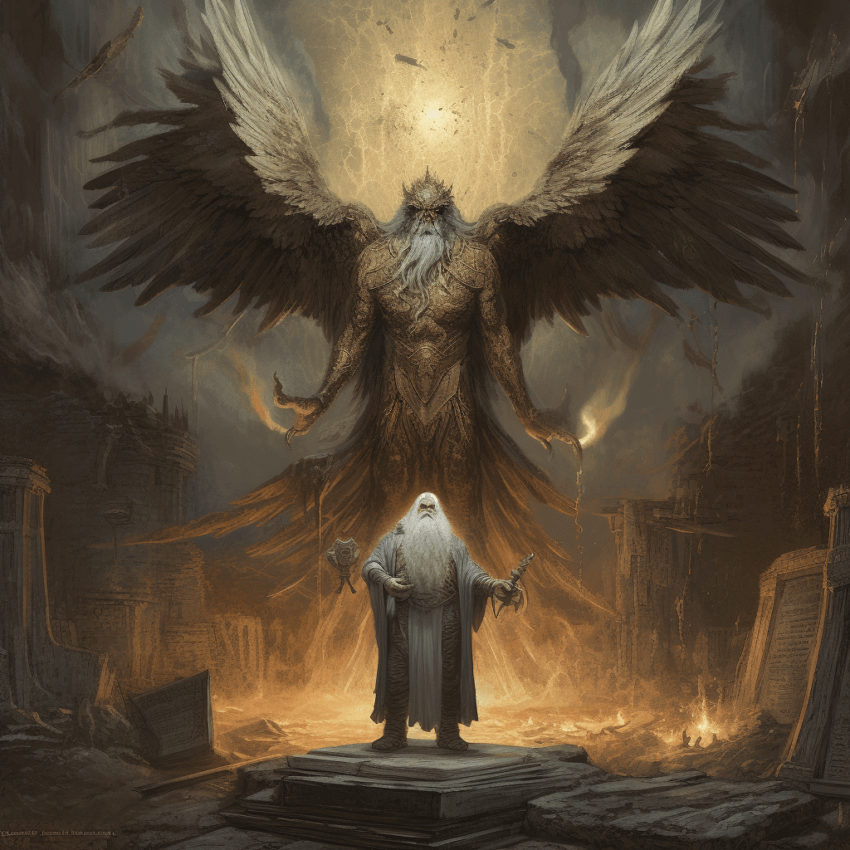This post may include affiliate links – check our Privacy Policy
Have you ever heard of the Book of Enoch? This ancient text, attributed to a man named Enoch who walked with God in eternal life before being taken up into heaven, is surrounded by controversy and mystery. Which creates a question: why stay away from the book of Enoch?
While some people believe it to be an inspired scripture that should have been included in the Christian church’s canon, others argue that it contains dangerous teachings about fallen angels and other supernatural entities.
We’ll explore why you should stay away from the Book of Enoch and what essential information you need to consider before diving into its pages. So buckle up and get ready for a wild ride through one of the most enigmatic books in human history!
Three main reasons to avoid the Book of Enoch:
- Controversial Content: The Book of Enoch contains content that revolves around fallen angels and their interactions, including sexual relationships with humanity. This goes against traditional Christian beliefs and can lead to confusion or even promote false teachings.
- Inconsistencies and Lack of Reliability: The book itself has many inconsistencies and contradictions, both within its own text and in comparison to other books in the Bible. Its historical accuracy is also questionable, making it an unreliable source for Christian doctrine.
- Non-Canonical Status: The Book of Enoch was not included in the Old or New Testament canon by mainstream Christianity. Its exclusion was not due to a conspiracy but rather because it did not meet the criteria for inclusion set by early church fathers. Therefore, it should not be considered on par with the authoritative books of the Bible.
Table of Contents
Who was Enoch and what did he preach?

According to the Bible, Enoch was a man who lived before the Great Flood and was known for his close relationship with God’s throne. In fact, he is one of only two people in scripture (the other being Elijah) who did not experience physical death but instead were taken up into heaven alive.
Enoch’s teachings are largely unknown since very little is mentioned about him in the Bible itself. However, according to Jewish tradition, it is said that Enoch received visions from God regarding the end times and wrote them down in a series of books that have been lost over time.
The Book of Enoch that we have today is actually a collection of works attributed to different authors over several centuries and compiled sometime between 300 BC and AD 500. It contains various accounts about angels, demons, giants, astrology, and other esoteric subjects.
Some people believe that Enoch’s writings contain hidden knowledge or divine revelations that can help us understand our place in the universe. Others argue that they are nothing more than fanciful tales with no basis in reality.
Regardless of which side you fall on this debate; it cannot be denied that Enoch remains an intriguing figure whose legacy continues to captivate religious scholars, and readers alike to this day.
Why stay away from the Book of Enoch?
The Book of Enoch is a text that has been surrounded by controversy for centuries. While it presents itself as god-energized scripture, the Christian church, and early church fathers have rejected it. So why stay away from the book of Enoch?
Firstly, the content of the Book of Enoch revolves around fallen angels and their interactions sexual relationships with humanity. This goes against traditional Christian beliefs and can lead to confusion or even false teachings.
Secondly, there are many inconsistencies within the text itself. It contradicts other parts of other books in the Bible and lacks historical accuracy.
Thirdly, it was never included in the Old Testament canon or accepted by mainstream Christianity. Its exclusion was not due to some kind of conspiracy but rather because it did not meet certain criteria for inclusion.
While some may find value in studying this text for historical or cultural purposes, others should be cautious about taking its contents at face value without proper context or understanding.
Why was the Book of Enoch removed from the Bible?
The Book of Enoch is an ancient text that dates back to the third century or second century, BC. It was originally written in Aramaic and Hebrew and then translated into Greek. The book contains a series of visions, prophecies, and teachings attributed to Enoch, an ancestor of Noah who was taken up into heaven.
Why was this intriguing book removed from the holy bible? Many people wonder about this question because they believe it holds crucial information for understanding Christian theology. However, there are several reasons why the Book of Enoch did not make it into the biblical canon.
One reason is that the early fathers of the Church could not agree on its authenticity as energized scripture. Some saw it as divinely inspired while others believed it contained heretical teachings that contradicted other parts of the Bible.
Another factor is that some elements within The Book of Enoch were considered too controversial or mystical for inclusion in mainstream Christian doctrine by some religious leaders at the time. For example, its passages on fallen angels had different interpretations among early Christians.
Later scholarship has disproven many claims made in this work through archaeology discoveries or historical research over time – which further eroded confidence in its credibility within theological circles throughout history.
Why are people scared of the Book of Enoch?
The Book of Enoch is a text that has been shrouded in controversy for centuries, and many people are afraid to even read it. But why? What makes this book so scary?
One reason may be the subject matter it covers. The Book of Enoch discusses fallen angels, giants, and other supernatural beings that some find unsettling. It also contains detailed descriptions of all the harsh things and punishments that await sinners in the afterlife.
Another factor could be its status as an inspired scripture. While some see it as a valuable addition to the religious texts and literature, others view it with suspicion because it was not included in the canonical Christian Bible.
Additionally, early fathers of the Church like Athanasius and Jerome were skeptical of the book’s authenticity due to contradictions with established doctrine and inconsistencies within its own text.
Fear surrounding the Book of Enoch stems from a combination of factors including its subject matter, disputed authenticity among early church leaders, and its exclusion from the official scriptural canon.
It’s Not Reliable
The Book of Enoch is not reliable. This is due to several reasons that scholars and theologians have pointed out. For one, the book was written long after Enoch’s time, which raises questions about its authenticity and accuracy.
Additionally, there are different versions of the Book of Enoch, with some containing more chapters than others. This inconsistency further adds to doubts about its validity.
Moreover, the book contains elements that contradict other energized scripture in the Christian church. The story it tells about collapsed angels having children with human women is not found in any other biblical text.
Early church fathers did not include the Book of Enoch in their list of books for canonization. This indicates that they did not consider it a reliable source for doctrine or theology.
Despite its popularity among some circles today, the lack of reliability surrounding the Book of Enoch should give readers pause before accepting it as an authoritative text on par with those included in the Testament canon.
It’s Controversial
The Book of Enoch has been a highly controversial text throughout history, with many scholars and theologians divided on its authenticity and relevance. Some argue that it contains valuable insights into the early Christian church’s beliefs about collapsed angels, while others believe it is nothing more than fiction.
One reason for the controversy surrounding the Book of Enoch is its origins. While some claim that it was written by the biblical figure Enoch himself, most scholars agree that it was actually composed several centuries after his death. This raises questions about its accuracy historians date and authenticity as encouraged scripture.
Another source of controversy is the book’s content itself. The Book of Enoch includes stories about angels mating with humans to create supernatural beings known as Nephilim, which some Christians find difficult to reconcile with their understanding of biblical teachings.
There are concerns about how the Book of Enoch fits into the wider canon of scripture. While some early fathers of the Church considered it to be divinely or other inspired scripture, later theologians rejected it as apocryphal or even heretical.
Whether or not one should read and accept the Book of Enoch’s book also remains a topic for debate among Christians today.
It’s Been Disproven
In summary, the Book of Enoch is a controversial text that has been deemed unreliable and disproven by many scholars and early fathers of the Church. While it may contain some interesting stories and teachings, its lack of authenticity as an encouraged scripture makes it necessary for Christians to avoid using it as a basis for their beliefs.
As believers in Christ, we must be cautious about what we read and accept as true. The canon of the Bible was carefully selected by early Christian leaders who were guided by the Holy Spirit to ensure that only authentic writings were included. Therefore, we should trust in this god-inspired, collection of books rather than relying on questionable texts such holy ones such as the Book of Enoch.
Ultimately, our faith should be grounded in biblical truth and Jesus Christ himself and his teachings which are found within the pages of the Bible. Let us always apply biblical truth and focus on growing closer to him through prayer, worship, and studying his word rather than seeking unproven texts that can lead us astray from God’s word and truth.
What Hidden Dangers In The Book Of Enoch?
While the Book of Enoch may seem intriguing and exciting to read, it is not a reliable or safe source for Christian teachings. Its controversial nature and lack of inclusion in noncanonical books in the biblical canon should serve as red flags for those considering reading it.
The Book of Enoch Isn’t Canonical
The Book of Enoch claims, of Enoch should be avoided due to its non-canonical status, lack of prophecies, controversial content, and unreliable nature. Despite some individuals finding it intriguing or even enlightening, it is not considered energized scripture by the Christian Church and was not included in the Old or New- Testament books of the canon. Additionally, early fathers of the Church rejected it as a valid text due to its questionable origins and inconsistencies with other biblical teachings.
FAQ
Why was the Book of Enoch removed from the Bible?
Jewish rejection of the book may be due to the textual nature of several early sections of lost books of the book that use material from the Torah; for example, 1 En 1 is a midrash on Deuteronomy 33.
What did Enoch say about Jesus?
He replied and said to me: “This is the son of the man who has righteousness, with whom dwells righteousness, who reveals all the treasures of that which is hidden because the Lord of the spirits has chosen him, and whose lot is always before the Lord of the spirits in uprightness.
Who really wrote the Book of Enoch?
It is unclear who wrote the Book of Enoch, but each portion has been added separately over hundreds ten thousands of years by a number of different authors. Enoch, the great-grandfather of the biblical Noah, is traditionally credited with it, however.
What did God teach Enoch?
People believed in Enoch and wanted to follow the Lord. Enoch had authority from God to baptize. All the children who believed in Enoch were baptized and became closer to the Lord.

